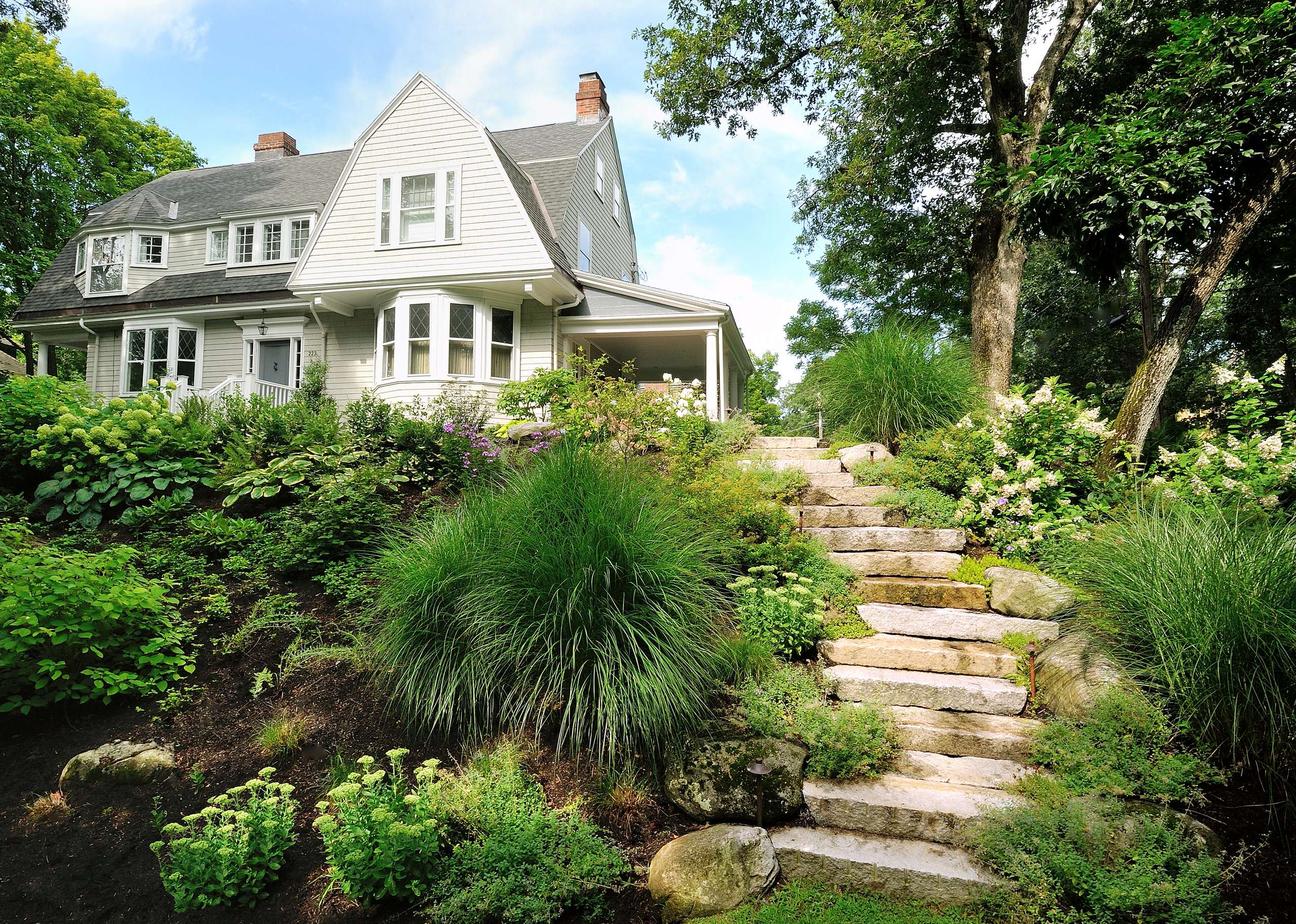Achieve a Stunning Outside Oasis With Thoughtful Steep Hillside Landscape Design Solutions
Changing a steep hill right into a captivating exterior sanctuary offers special obstacles that require ingenious landscape design solutions. Methods such as terracing, the installation of maintaining wall surfaces, and the selection of native plants play important duties in this process. Furthermore, integrating water attributes can better enhance the landscape's appeal.
Comprehending Steep Hill Challenges
Landscaping on high hillsides offers special difficulties that need careful consideration and strategic preparation. The disposition of the terrain can result in issues such as dirt disintegration, water overflow, and restricted access, every one of which need to be addressed to create a useful and visually pleasing outdoor space.
Among the main worry about steep hillside landscaping is erosion, which can arise from heavy rainfall or inappropriate drain. This not just impacts plant wellness but can additionally endanger the stability of the incline. Executing effective disintegration control steps, such as growing deep-rooted vegetation or making use of mulch, is crucial in protecting the integrity of the landscape.

Designing With Terracing Methods
To alleviate the difficulties presented by high hillsides, integrating terracing methods can be an efficient option. This style technique transforms a sloped landscape into a series of flat, level locations, developing an aesthetically striking and useful exterior area. Terracing not just assists to avoid soil erosion but additionally promotes far better water drain, which is vital in preserving the health and wellness of plants and the stability of the hillside.
When developing terraces, mindful factor to consider of the incline's angle and the soil kind is crucial. Each balcony must be tactically placed to make the most of sunlight direct exposure while lessening the danger of overflow. The use of native plants on each degree can improve biodiversity, promote sustainability, and lower upkeep requirements. Additionally, including paths between balconies can enhance ease of access and encourage expedition of the landscape.
Terraced yards can serve multiple functions, including veggie production, decorative displays, or outside seats areas. By making use of materials that mix harmoniously with the surrounding environment, the terracing can improve the total aesthetic appeal of the property. Eventually, thoughtful terracing transforms steep hills into useful, lovely spaces that welcome interaction and satisfaction.
Implementing Retaining Walls
When confronted with the challenges of high surface, carrying out retaining walls can supply both architectural support and aesthetic improvement to a landscape. These wall surfaces serve to stop dirt disintegration, stabilize slopes, and develop flat areas for horticulture or entertainment use. Steep hill landscaping. By effectively taking care of water overflow and decreasing soil activity, keeping walls safeguard your landscape investment while improving safety and security

Professional installation is crucial to ensure the long life and performance of preserving wall surfaces. Proper drainage systems need to be incorporated to ease hydrostatic pressure, avoiding architectural failing. Consulting with landscape experts will make certain that the style aligns with your general vision while sticking to regional policies.
Deciding On Indigenous Plants
Choosing indigenous plants for your landscape layout offers countless eco-friendly and aesthetic benefits. Steep hill landscaping. Indigenous plants are adjusted to the neighborhood environment and dirt conditions, needing much less water and upkeep contrasted to non-native varieties. This adaptability not only conserves sources yet likewise promotes a healthier ecological community, as native plants sustain regional wild animals, including pollinators such as bees and butterflies
Integrating native plants right into your steep hillside landscaping can boost soil stability, decreasing disintegration and promoting a well balanced community. Deep-rooted indigenous plants help secure the soil, making them suitable for sloped locations. These plants typically exhibit vivid colors and varied textures, creating a visually enticing landscape that integrates with the surrounding environment.
When selecting native plants, consider their growth habits, seasonal rate of interest, and compatibility with other types. Grouping plants with comparable water and sunshine needs can result in a more cohesive style, while likewise streamlining upkeep. By picking native plants, you not only grow a lasting outdoor sanctuary but additionally add favorably to the local biodiversity, guaranteeing that your landscape prospers for years to come.
Incorporating Water Functions
Including water functions right into your high hill landscape design can significantly boost both the visual charm and ecological performance of the area. The audio of moving water creates a calm atmosphere, while visually, it can function as a prime focus that attracts the eye and adds deepness to the landscape.
When selecting water functions, think about choices that complement the natural shapes of your hillside. Waterfalls, for example, can cascade the slope, creating aesthetic interest and promoting healthy and balanced drainage. Ponds can also be integrated into the design, urging local wild animals and providing habitats for various species.
Additionally, the placement of plants around these features is important. Indigenous marine plants not just enhance the elegance of the water More Bonuses attribute yet additionally add to its eco-friendly equilibrium by filtering pollutants and giving food for neighborhood animals.
Upkeep is one more essential aspect; make certain that your water attribute is designed for simple upkeep. A correctly built attribute will certainly call for minimal treatment, allowing you to take pleasure in the charm and tranquility it uses without excessive labor. Eventually, attentively bundled water functions can change your high hill landscape into an exciting outdoor oasis.
Final Thought
In conclusion, transforming a steep hill right into a gorgeous outdoor oasis requires thoughtful landscape design techniques that deal with blog erosion control and access. The combination of terracing techniques, the application of retaining walls, and the choice of native plants are essential elements of efficient design. Additionally, integrating water features boosts both visual allure and drainage effectiveness. With cautious planning and implementation, high hills can end up being calm hideaways that provide both performance and aesthetic delight.